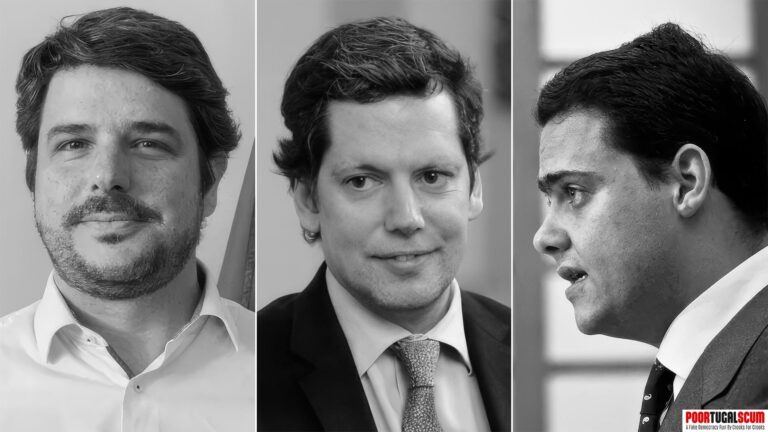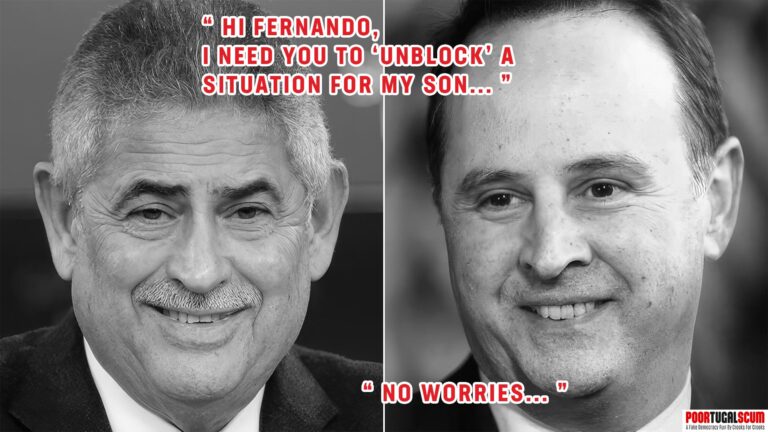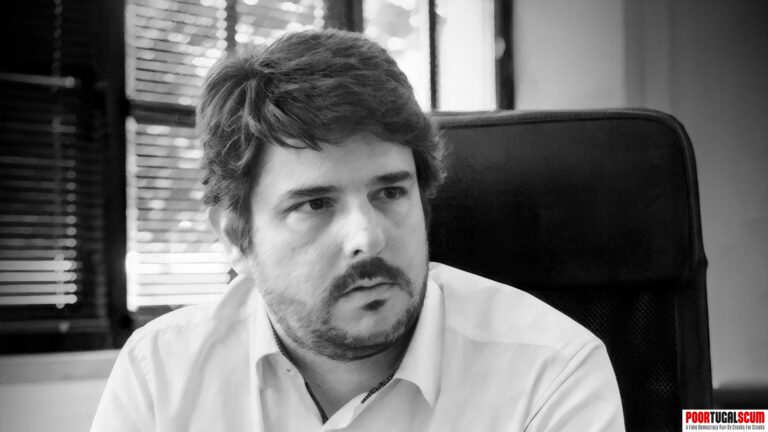The doctor who heads the Lisbon Municipal Council signs not one, but three direct contracts with a member of his party. This member, who seems to have many and very generous friends ((with money that does not belong to them), also received a salary from another party friend, who was also very generous with other people’s money, the Portuguese taxpayers’ money.
This doctor, for some reason that only he knows, hired this lady three times, for a total of 53,500 euros, and for the same allusive role, “consulting”. So strange… Do you have to hire someone three times to do the same thing?! And we don’t even know what that thing was?!
It was also shown that this lady did not actually provide any service. And this is just what is known, now imagine what is not known, not only about this specific case, but about all the daily corruption in Portugal.
It should be noted that this police investigation is superfluous, because in the end, as always, there will be no real convictions and everything will be archived/dismissed with the worn-out motive that “no wrongdoing was found”. And in a few years, the Portuguese will forget, which is not difficult at all, because at this moment they have already forgotten.
Just a “small” detail. This investigation started only eight years after an anonymous tip, yes, you read that right! Hmmm! I wonder why that is?
We are talking about a country where the average monthly pension is 490.65 euros, but many people receive a change of 231.88 euros!
The following article is a translation (mostly MT). You can find the link to the original website at the end of it.
Doctor who heads the Lisbon Parish Council signed with Patrícia Brito Leitão, one of the PSD members investigated during the Tutti Frutti operation, several contracts for consultancy to the Executive
Ricardo Mexia, the doctor who heads the Lumiar Parish Council, made three direct agreements for advisory services to party colleague Patricia Leitão – one of the PSD activists who appears in the Tutti Fruti case, and who, according to the Public Ministry,
has had for a few years, received agreements to provide support to the PSD group in the Lisbon Municipal Assembly, without actually providing the services.
The first contract was signed just two months after Ricardo Mexia was elected by the Novos Tempos Coalition, of PSD and CDS, as president of the board in 2021. Since then, Mexia, who during the pandemic was at the head of the National Association of Doctors of Public Health,
has already made three agreements with the Social Democrat totaling 53,500 euros for consultancy.
In November 2021, the green light was given for the first contract worth 4,900 euros. The second occurred in January 2022 for 24 thousand euros and the last one was made in January of this year for 24,600 euros, everything plus VAT.
It was, according to the document on the government platform, a service provision contract “for the exercise of technical advisory services functions to the president of the parish council”. In other words, Mexia hired Patrícia Leitão to advise him for a monthly fee of 2,050 euros, as indicated in the contract document.
Patrícia Leitão, a PSD member, is cited in the Tutti Fruti case, an investigation by the Public Ministry that reveals a web of influences on local power between the PS and PSD, including combinations of lists for the 2017 municipal elections. In this investigation Patrícia Leitão appears as one of the members who received, in 2013, monthly payments of around 1500 euros, given by Sérgio Azevedo, former PSD deputy, for technical services to the social democratic group in the Lisbon Municipal Assembly, which the Public Prosecutor’s Office suspects that they were not effectively carried out.
Questioned by CNN Portugal, Ricardo Mexia says that the hiring was due to the need to “have several services working”, as there were “no necessary resources”. “So, we move forward with direct agreements and simplified processes. However, we already have several tenders underway, and therefore when the processes are completed, it is expected that these services will no longer be necessary”, he highlights.
Ricardo Mexia also emphasizes that “the issue of possible incompatibility does not seem to exist”. “Neither the criterion of party affiliation is relevant. Neither positively nor negatively. We have people there who are members of other parties and others who are not members of any (which are the majority).”










She was hired three times because that is an annual contract. One time for each year, thats the way it must be.
You must inform yourself better before you write something about someone.